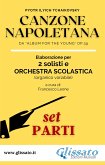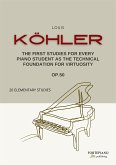In the realm of piano pedagogy, few works have the distinction of being as simultaneously approachable and effective as Louis Köhler's "Kleine Schule der Geläufigkeit, Op.242" (Little School of Velocity). This collection of studies, crafted by Köhler—a luminary in the field of piano education during the 19th century—serves as a testament to his deep understanding of the technical and expressive demands of piano playing.
Louis Köhler, born in 1820, was not only a prolific composer but also an esteemed educator whose methods have influenced generations of pianists. His approach to teaching was revolutionary for its time, emphasizing not just the mechanical aspects of technique but also the musicality that transforms mere notes into art.
"Kleine Schule der Geläufigkeit" is a prime example of Köhler's pedagogical genius. The work is meticulously structured, guiding the student through progressively challenging exercises designed to enhance dexterity, agility, and speed. Each study, while focusing on technical development, never loses sight of musical expression. They are not just exercises; they are miniature musical journeys, each with its own unique character and challenges.
This opus is more than a collection of technical drills; it is a carefully curated pathway towards pianistic fluency. Köhler understood that velocity on the piano is not merely about playing fast but about achieving clarity, precision, and ease at any speed. The studies in this collection address a wide range of technical challenges, from intricate finger work to wrist agility, always within a musical context that keeps the student's interest and motivation alive.
For the aspiring pianist, "Kleine Schule der Geläufigkeit" offers a balanced blend of discipline and artistry. For the teacher, it provides a structured yet flexible framework to develop the technical prowess of their students. Louis Köhler's work stands as an enduring legacy in the world of piano education, and this opus is a shining example of his contribution to the art of piano playing.
Piano method, Piano practice, Piano exercises, Piano teaching, Piano course,Piano technique, Piano teacher, Piano studies, Piano pedagogy, Classical piano,Piano skills, Piano playing guide.
Louis Köhler, born in 1820, was not only a prolific composer but also an esteemed educator whose methods have influenced generations of pianists. His approach to teaching was revolutionary for its time, emphasizing not just the mechanical aspects of technique but also the musicality that transforms mere notes into art.
"Kleine Schule der Geläufigkeit" is a prime example of Köhler's pedagogical genius. The work is meticulously structured, guiding the student through progressively challenging exercises designed to enhance dexterity, agility, and speed. Each study, while focusing on technical development, never loses sight of musical expression. They are not just exercises; they are miniature musical journeys, each with its own unique character and challenges.
This opus is more than a collection of technical drills; it is a carefully curated pathway towards pianistic fluency. Köhler understood that velocity on the piano is not merely about playing fast but about achieving clarity, precision, and ease at any speed. The studies in this collection address a wide range of technical challenges, from intricate finger work to wrist agility, always within a musical context that keeps the student's interest and motivation alive.
For the aspiring pianist, "Kleine Schule der Geläufigkeit" offers a balanced blend of discipline and artistry. For the teacher, it provides a structured yet flexible framework to develop the technical prowess of their students. Louis Köhler's work stands as an enduring legacy in the world of piano education, and this opus is a shining example of his contribution to the art of piano playing.
Piano method, Piano practice, Piano exercises, Piano teaching, Piano course,Piano technique, Piano teacher, Piano studies, Piano pedagogy, Classical piano,Piano skills, Piano playing guide.









